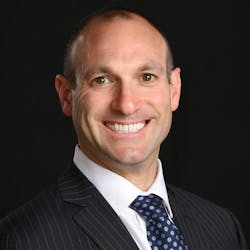Music therapy and virtual reality to treat dental anxiety and pain during surgery
Dental anxiety and fear of the dentist are very real challenges that many people face. Fortunately, a new study in the Journal of the American Dental Association demonstrated that easy-to-implement psychological interventions such as music therapy and watching virtual reality (VR) during third-molar extraction significantly lowered perioperative pain and anxiety compared to a control group that did not use those interventions.1
A total of 275 patients who had to undergo surgery for third-molar extraction participated in a randomized controlled trial and were divided into three parallel groups: music therapy intervention (n = 91), virtual reality intervention (n = 93), and control (n = 91). The music intervention group listened to classical music for 20 minutes prior to surgery and 20 minutes during the surgery. The VR group used three-dimensional glasses and headset and viewed images of the ocean floor accompanied by soothing sounds in the same time frame as the music intervention group. The control group received no psychological intervention.
Results of the study
Patients in the music therapy and VR groups showed a greater reduction in anxiety level scores after third-molar extraction surgery: reduction in total anxiety in the music group was 15.12 (95% CI), reduction in total anxiety in the VR group was 9.80 (95% CI), and reduction in total anxiety in the control group was 6.63 (95% CI). The intensity of pain after the intervention was lower in patients in the music therapy group than patients in the control group. After the intervention, the music therapy and VR groups also presented a significant decrease in systolic blood pressure, diastolic blood pressure, and heart rate compared with the control group.
You may also be interested in …
Dental pain: Can we predict who has a higher risk prior to treatment?
How can listening to music help with dental anxiety?
Music and other psychological distraction methods have been used to treat dental anxiety and pain for many years.2 These can be powerful tools in helping patients who suffer from dental anxiety and pain manage their symptoms. Music has been found to reduce anticipatory anxiety, decrease pain levels, and even improve oxygen saturation during dental procedures.3
When it comes to treating dental anxiety, music can be used in a variety of ways. One of the most common is through active refocusing of attention. This technique involves focusing on the music instead of the fear or discomfort associated with the dental procedure. Music-guided deep breathing is another technique that can help reduce anxiety levels by allowing patients to focus on their breathing instead of their fear or discomfort. Music-assisted relaxation techniques such as guided imagery and progressive muscle relaxation have also been found to be effective in reducing dental anxiety.
How can listening to music help with dental pain?
Music and other psychological distraction methods can also help reduce pain experienced during dental procedures. Studies have shown that listening to music during a procedure can reduce both subjective and objective measures of pain.4 In addition, music has been found to increase patient satisfaction with the procedure and improve overall healing outcomes. Studies show that patients with preoperative anxiety and perceived pain will have more perioperative and postoperative pain. Music has been found to improve oxygen saturation levels during dental procedures, which is important for maintaining healthy tissue oxygenation and preventing complications such as hypoxia or tissue death due to lack of oxygen supply.
Overall, music and VR distraction can be affordable and effective tools for managing both dental anxiety and pain during dental procedures. When treating anxious patients, dentists should consider incorporating these techniques into their practices as they can provide significant benefits for patient comfort and safety during treatment.
Editor’s note: This article originally appeared in Perio-Implant Advisory, a chairside resource for dentists and hygienists that focuses on periodontal- and implant-related issues. Read more articles and subscribe to the newsletter.
References
- De Ramón LAS, Martínez AFF, Carricondo ARG, Gálvez FE, Rodríguez RA. Effect of virtual reality and music therapy on anxiety and perioperative pain in surgical extraction of impacted third molars. J Am Dent Assoc. 2023;154(3):206-214. doi:10.1016/j.adaj.2022.11.008
- Lee KC, Chao YH, Yin JJ, Hsieh HY, Dai WJ, Chao YF. Evidence that music listening reduces preoperative patients’ anxiety. Biol Res Nurs.2012;14(1):78-84. doi:10.1177/1099800410396704
- Bradt J, Teague A. Music interventions for dental anxiety. Oral Dis. 2018;24(3):300-306. doi:10.1111/odi.12615
- Monteiro JLGC, da Silva Barbirato D, Moraes SLD, Pellizzer EP, do Egito Vasconcelos BC. Does listening to music reduce anxiety and pain in third molar surgery?—a systematic review. Clin Oral Investig. 2022;26(10):6079-6086. doi:10.1007/s00784-022-04640-5
About the Author

Scott Froum, DDS
Editorial Director
Scott Froum, DDS, a graduate of the State University of New York, Stony Brook School of Dental Medicine, is a periodontist in private practice at 1110 2nd Avenue, Suite 305, New York City, New York. He is the editorial director of Perio-Implant Advisory and serves on the editorial advisory board of Dental Economics. Dr. Froum, a diplomate of both the American Academy of Periodontology and the American Academy of Osseointegration, is a volunteer professor in the postgraduate periodontal program at SUNY Stony Brook School of Dental Medicine. He is a PhD candidate in the field of functional and integrative nutrition. Contact him through his website at drscottfroum.com or (212) 751-8530.

